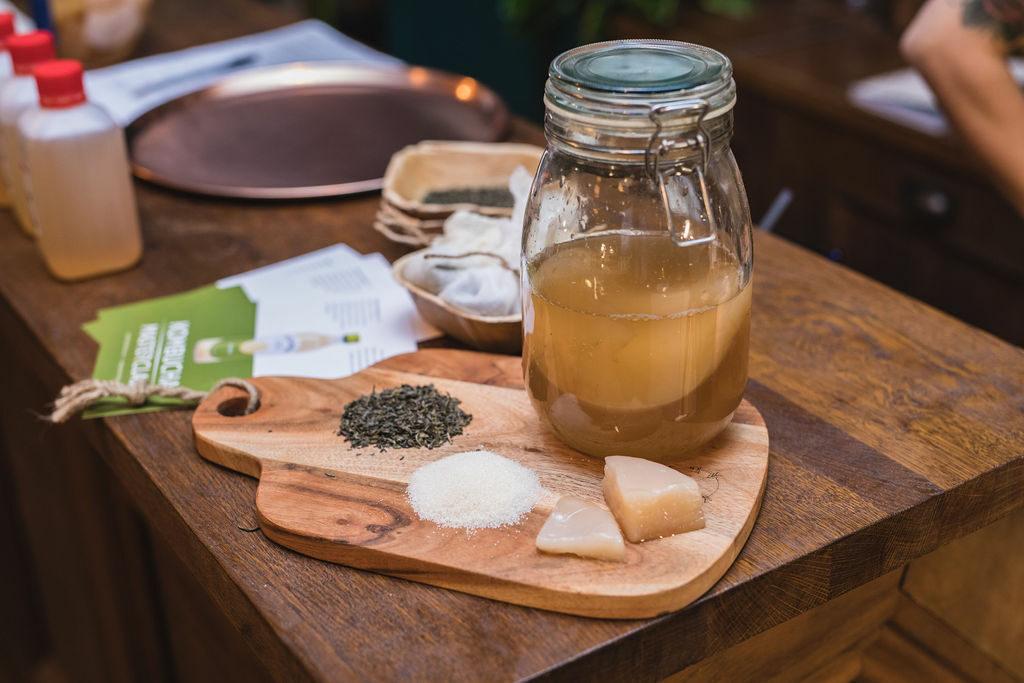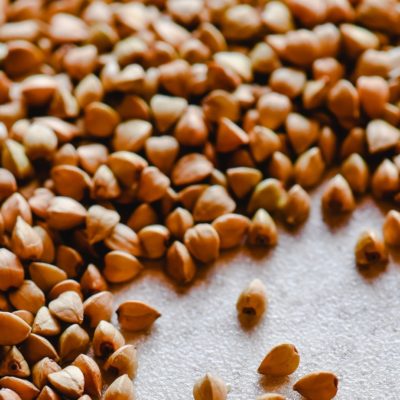Health Benefits of Fermented Tea
Amuse ‘Booch’, anyone? Seeing as you’ve landed yourself here, there’s a strong chance you’ve already encountered ‘Kombucha’ and might’ve even heard the potential benefits to health. With a recent surge in popularity, it’s important to dig beneath the clever marketing and identify where we actually stand on the science. Forms of the brew have been […]

Amuse ‘Booch’, anyone?
Seeing as you’ve landed yourself here, there’s a strong chance you’ve already encountered ‘Kombucha’ and might’ve even heard the potential benefits to health. With a recent surge in popularity, it’s important to dig beneath the clever marketing and identify where we actually stand on the science.
Forms of the brew have been around for thousands of years, with recipes dating back to ancient populations for recreational and medicinal use. Traditionally, green (or black) tea is fermented with live cultures known as a ‘SCOBY’ (Symbiotic Culture of Bacteria and Yeast) and their favourite food: raw cane sugar.
Sugar!? Really?
The organic sugar in Equinox Kombucha is slowly consumed through enzymatic actions during the fermentation process.
In English, the sugar is eaten by the SCOBY, not you. The longer the fermentation time, the less sugar is left in the batch.
The controlled microbial growth and slow conversion of such food components actually create a low sugar drink, otherwise rich in probiotic compounds, vitamins and antioxidants. Contrariwise, current research shows a mere anecdotal link between Kombucha and human health. So, this inspires the question: What are the associated benefits of Kombucha, and how has it been linked to health?
Fermentation: Probiotics
Kombucha is highly praised for its potential probiotic compounds obtained from fermentation; similar to the likes of Sourdough, Sauerkraut, Kimchi, Miso, and Tempeh.
The World Health Organization (WHO) defines probiotics as: ‘Live organisms which, when administered in adequate amounts, confer a health benefit on the host’ [1]. They’re essentially a consumable form of bacteria with boasted benefits to our digestive health, immune function, nutrient absorption, and regular movement of waste. These claims follow evidence of increased biodiversity in our ‘microbiome’ after exposure to such bacteria we encounter from our lifestyle, our environment and the food we choose for each meal.
If you haven’t yet heard of the ‘microbiome’, it’s a term used to collectively label the trillions of bacteria residing within our gut; an ecosystem of microorganisms living in unique balance, yet differing from person to person. The greater our gut biodiversity, the lower the risk of negative health outcomes.
Where human studies are yet to isolate the probiotic benefits of Kombucha drinks, their cultures are seen to hold several different species of lactic-acid bacteria; strains which may hold further probiotic functions within the gut [2]. In clinical trials, lactic-acid strains have been observed to improve cardiovascular, immune system and even metabolic health [3]. Additionally, Acetic Acid is produced as a by-product of the fermentation process; a compound heavily associated with the control of Blood Sugar.
To be clear, fluctuation of blood sugar is perfectly normal; the natural balance ensures your cells are fed with an appropriate quantity of glucose. Alternatively, uncontrolled spikes in either direction can increase your risk of Diabetes, Stroke or Heart Disease, and should be considered when following a diet rich in processed, high sugar foods. Acetic Acid is by no means a cure, but may inhibit excessive insulin responses and therefore assist the body to maintain regular blood glucose [4].
A little positivi-Tea.
It’s not all theory and ‘association’, however, there’s one key component in each and every Equinox bottle renowned for its influential effects on the mind and body; Green Tea.
Equinox brew their Kombucha with a blend of Green Tea leaves found on their travels throughout Asia, giving an independent taste profile from a raw and organic ingredient. Each tea-based drink provides a powerful punch of antioxidants by the name of ‘polyphenols’ and ‘catechins’.
Antioxidants protect our cells against oxidative damage caused by malicious ‘free radicals’ in the body. Not only are they seen to reduce inflammation [5], they can even contribute to the reduction of chronic neurodegenerative disease risk in conditions like Parkinson’s and Alzheimer’s [6].
It’s worth noting that green tea drinkers have been seen to have 31% less risk of developing heart disease in multiple studies [7-8], a factor which may also apply to organic and traditional Kombucha.
Nevertheless, each Kombucha brand will use different strains of teas, if any at all. Many ‘Kombucha-like products’ are available and will have a very limited antioxidant profile. To ensure the best quality of your brew, make sure you delve into the ingredients list to check it contains real tea!
Sugar-free Sugar
Perhaps one of the biggest dietary changes you can influence with the introduction of Kombucha, is a means to reduce the overall consumption of alcoholic or sugar-sweetened-beverages.
In the UK, it is not uncommon to hear alcohol, seasonal lattes, fruit juices & smoothies are a staple component of our diets; some of which are even marketed as ‘healthy alternatives!’
Health Benefits of Kombucha
Furthermore, it’s been noticed nationwide that ‘non-drinkers’ in pubs and licenced drinking events are increasing, raising the demand for other suitable alternatives.
Kombucha provides a low sugar substitute to traditional processed drinks, priced similarly and additionally packed with a diverse range of antioxidants, vitamins and minerals.
*Wink Wink* Equinox, get your brew on tap!
Hydration Nation
Finally, hydration plays a crucial factor in your physical and psychological health. Being dehydrated by as little as 2% of your bodyweight can impair cognitive performance in tasks that require attention, psychomotor skills, and immediate memory recall. Furthermore, reduced body-water will inhibit blood circulation, muscle recovery and physical performance across strength and aerobic exercise.
For this reason, adding a bottle or two of your favourite Kombucha to your weekly shop might just incentivise you to throw back a few more fluids.
To summarise
Kombucha has the foundations of a drink greatly positive to health and wellbeing. Though human studies are yet to identify the probiotic effects, there is valuable evidence to support the consumption of whole food fermented foods and products of green tea.
Furthermore, substituting an organic Kombucha for alcoholic drinks, high-sugar drinks, or even artificially sweetened alternatives can have a substantial influence on health across all populations.
For the price of your morning coffee, packed full of flavour, and potentially positive to your health, what’s to lose?
Alex Jeffery (@thefoodiejeff)
BSc Sports Therapy
MSc Human Nutrition

References
- Hotel, A.C.P. and Cordoba, A., 2001. Health and nutritional properties of probiotics in food including powder milk with live lactic acid bacteria. Prevention, 5(1), pp.1-10.
- Marsh, A.J., O’Sullivan, O., Hill, C., Ross, R.P. and Cotter, P.D., 2014. Sequence-based analysis of the bacterial and fungal compositions of multiple kombucha (tea fungus) samples. Food microbiology, 38, pp.171-178.
- Pessione, E. and Cirrincione, S., 2016. Bioactive molecules released in food by lactic acid bacteria: encrypted peptides and biogenic amines. Frontiers in microbiology, 7, p.876.
- Johnston, C.S., Kim, C.M. and Buller, A.J., 2004. Vinegar improves insulin sensitivity to a high-carbohydrate meal in subjects with insulin resistance or type 2 diabetes. Diabetes care, 27(1), pp.281-282.
- Hussain, T., Tan, B., Yin, Y., Blachier, F., Tossou, M.C. and Rahu, N., 2016. Oxidative stress and inflammation: what polyphenols can do for us?. Oxidative Medicine and Cellular Longevity, 2016.
- Wojsiat, J., Zoltowska, K.M., Laskowska-Kaszub, K. and Wojda, U., 2018. Oxidant/antioxidant imbalance in Alzheimer’s disease: therapeutic and diagnostic prospects. Oxidative medicine and cellular longevity, 2018.
- Shimazu, T., Kuriyama, S., Hozawa, A., Ohmori, K., Sato, Y., Nakaya, N., Nishino, Y., Tsubono, Y. and Tsuji, I., 2007. Dietary patterns and cardiovascular disease mortality in Japan: a prospective cohort study. International journal of epidemiology, 36(3), pp.600-609.
- Kuriyama, S., 2008. The relation between green tea consumption and cardiovascular disease as evidenced by epidemiological studies. The Journal of Nutrition, 138(8), pp.1548S-1553S.










